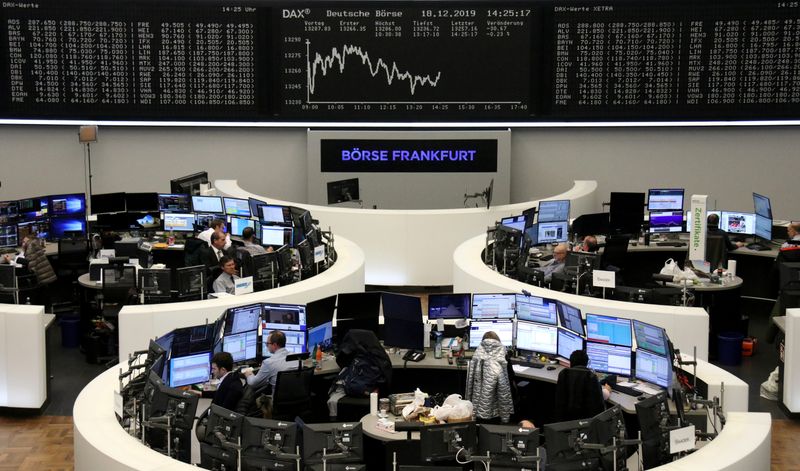This post was originally published on this site
https://i-invdn-com.akamaized.net/trkd-images/LYNXMPEFBI0WV_L.jpg © Reuters. The German share price index DAX graph is pictured at the stock exchange in Frankfurt
© Reuters. The German share price index DAX graph is pictured at the stock exchange in FrankfurtBy Joice Alves
LONDON (Reuters) – Bond yields rose and Sweden’s crown stayed ice cool on Thursday as the country became the first to raise interest rates out of sub-zero territory, while world stocks drifted off this week’s record highs.
It was a packed day of central bank action all round. While Sweden made its big move, Norway sat tight on rates, and sterling pulled out of a dive even as two Bank of England policymakers pushed for a UK interest rate cut.
Stock markets stalled, however, after their rapid recent run-up and with a record-high Wall Street now facing the complexity of U.S. President Donald Trump’s impeachment in Washington.
Wall Street futures () pointed to a subdued start (), while the pan-European index () continued to dip in and out of the red, although Britain’s blue-chip FTSE index () did manage to hold a 0.2% rise. ()
Asia has also pulled back from a 1-1/2 year peak.
The focus remained on the day’s big milestone – Sweden ending five years of negative interest rates. The crown stayed calm after the move, rising as much as 0.2%.
Bond yields rose across Europe though, with those in higher-rated countries such as Germany, France and the Netherlands up 3-4 bps on the day () ().
Germany’s benchmark 10-year bond yield rose to -0.212% (), a new six-month high, pushing past a peak touched on Friday.
Economists now wonder how Sweden’s open economy will react and whether other central banks with sub-zero rates in the euro zone, Japan, Denmark, Switzerland and Hungary will consider following suit.
“This market doesn’t look at macro and earnings, it just looks at monetary developments,” said Stéphane Barbier de la Serre, macro strategist at Makor Capital Markets, referring to the huge role low interest rates have played in driving asset prices higher over the last decade.
“If the market thinks central banks (globally) are done with being dovish then we would see some volatility,” he added.
Commerzbank (DE:) said Sweden’s hike showed it was throwing “in the towel in a state of exasperation” at the impact of negative rates, and “neither because the economy is doing so well (on the contrary: the PMI is in free fall) nor because inflation justified (it)”.
POUND REBOUND
The British pound also gained after suffering heavy losses this week as concerns have returned that Britain could still crash out of the European Union without a trade deal in place when a transition period ends in December 2020.
Sterling rose 0.2% to $1.3104 after falling more than 3%. It had reached an 18-month high on Dec. 13 after UK Prime Minister Boris Johnson’s Conservative Party won a majority in a general election.
Against the euro, it stood at 84.99 pence (), close to its weakest since Dec. 4. [/FRX] British inflation remained at a three-year low in November, data had showed on Wednesday.
The Australian dollar jumped by 0.3% to $0.6879 after better-than-expected labor-market data made interest rate cuts less likely. The yen barely moved from 109.58 per dollar after the Bank of Japan kept its quantitative easing in place and issued a gloomier assessment on factory output.
In Asia overnight, Japan’s Nikkei () fell 0.3% and China’s stocks slipped () for the second session despite trade optimism. Australian shares () ended 0.3% lower, led lower by mining stocks.
Investors were also watching proceedings in Washington, where the Democratic-led House of Representatives voted to impeach Trump for abuse of power and obstruction of Congress.
Market reaction was limited, since the Republican-controlled Senate is very widely expected not to remove Trump from office.
In commodities, Brent crude () was up 0.1% to $66.26 per barrel. U.S. crude () also gained 0.04% to $60.97 a barrel after U.S. government data showed a decline in crude inventories.
Prices are likely to be supported by production cuts coming from the Organization of the Petroleum Exporting Countries and its allies, including Russia.
Gold eased as optimism over U.S.-China trade ties offset political uncertainty over Trump’s impeachment. dipped 0.1% to $1,474.64 per ounce.
Elsewhere, palladium gained 0.5% to $1,934.08 per ounce. Prices of the auto catalyst metal hit an all-time peak of $1,998.43 on Tuesday, within a whisker of breaking above $2,000 for the first time due to a gaping supply deficit.

